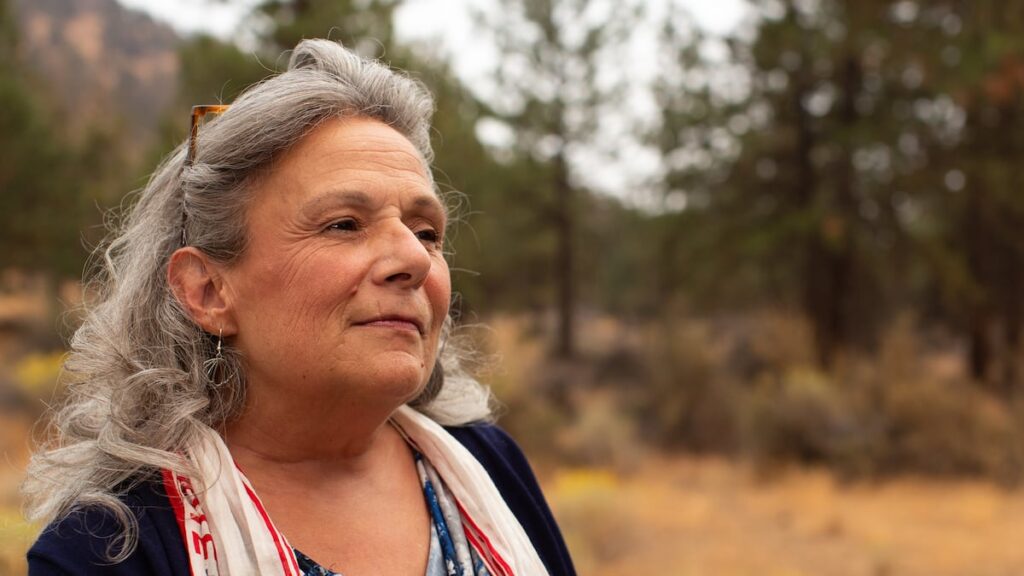Editor’s note: Election Day is Tuesday, Nov. 5. Stay informed with OPB on the presidential race, key congressional battles and other local contests and ballot measures in Oregon and Southwest Washington at opb.org/elections.
At the beginning of this year, Deschutes County Democrats started asking Barb Campbell if she planned to seek another term on the Bend City Council. Admittedly, she was noncommittal until this summer. That’s when she made her intentions known with local party leaders that she would be running for reelection.
In a surprising turn, the Deschutes Democrats chose not to endorse Campbell, a registered Democrat since 2005, and a city councilor for 10 years.
Campbell said she’s undeterred, and is bucking an understood agreement that candidates who seek and do not get the Deschutes Democrats endorsement should exit the race.
Related: What you need to know about voting in Oregon and Southwest Washington
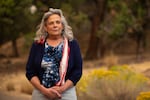
Barb Campbell, a Bend City Councilor running for re-election, stands in Pilot Butte State Park in Bend, Ore., on Sept. 10, 2024.
Kathryn Styer Martínez / OPB
It’s an agreement she acknowledges she has benefitted from in her past races. But she has grown increasingly uncomfortable with the idea this election cycle. She said talented and diverse newcomers have dropped out of the nonpartisan race so they can retain the county party’s favor.
“It seems clearly this has gone off the rails when somebody drops out because they’re afraid of the blowback within the Deschutes Democrats,” she said. “That, I don’t think is a good reason to drop out of a nonpartisan race. That bothers me.”
Deschutes Democrats chair Jason Burge said the party has been making endorsements for the Bend City Council race since 2018, but they do not require candidates to drop out if they don’t get an endorsement.
New research is showing partisan politics seep into nonpartisan races across the country. In Deschutes County, interviews with would-be candidates spanning six years reveal a pattern of people dropping out of races when Democratic Party members raise issues of viability and then flex an army of door knocking volunteers to back preferred candidates.
Related: Issues important to Oregon voters
This year, Bend residents will have fewer choices and viewpoints to select from by the time their ballots arrive.
Campbell said Deschutes Democrats’ tactics have effectively gatekept local seats. These seats typically serve as launch pads into larger political careers.
For the past few election cycles, Deschutes Democrats have asked candidates seeking an endorsement to sign a “candidate statement,” Burge said.
Related: Listen to ‘OPB Politics Now’
The two-page document lists out a number of pledges that endorsed candidates make and affirms support for candidates in nonpartisan races who are “Democrats in good standing.” The intention, according to party members, is partly to keep vote splitting from happening, and to consolidate support behind one Democrat. It’s a successful strategy that has helped win seats in what was once a Republican-controlled city council. The current Bend mayor and five of the six city council members are precinct committee people for the Deschutes Democrats, as are the endorsed council candidates this cycle.
Bend City Council seats are nonpartisan, meaning the people who voters pick from to make policy choices do not appear on ballots with a party affiliation. Unlike partisan contests, such as state and federal races, nonpartisan contests offer voters a chance to set aside a standard Democrat versus Republican dynamic when picking leaders.
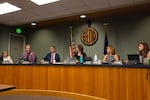
FILE – City councilors attend a city council meeting in Bend, Ore. on July 17, 2024.
Kathryn Styer Martínez / OPB
OPB requested the withdrawal forms from the past four Bend City Council elections, including this one. They reveal at least 12 candidates who withdrew from contests going back to 2018. At least nine of those people were then or are now aligned with Democrats. This cycle, three candidates seeking Democratic endorsement dropped out, leaving an uncontested path for the party’s endorsed candidate in at least one race.
On Aug. 19, James Teeter submitted his withdrawal form, the day after the Deschutes Democrats endorsed his opponent Megan Norris.
His reason given on the form: “Deschutes Dem’s have endorsed Megan Norris.
Teeter SEL 150 Withdrawal form_redacted
Teeter declined to comment for this story.
When candidates sign the statement, current Bend City Councilmember Mike Riley said, “you make an agreement to do certain things, and I think the sort of general sense is you probably should drop out. It’s not said explicitly, but that’s the general sense of it — the conclusion you would draw when you read the whole thing.”
When asked if people have dropped out because they felt like they had to as a result of the candidate statement, Campbell responded, “Yes. 100%.”
OPB asked Riley if Deschutes Democrats have taken away choice from Bend voters through the endorsement process. He responded it is “a candidate’s decision” whether to drop out.
“I don’t think that you get to blame the Deschutes Dems,” he said, “you have to just assess resources, time and effort, likelihood to win.”
Campbell said the system is unfair to Bend voters because it weeds out viable candidates before Bend residents get a chance to decide for themselves.
In an email obtained by OPB, a Bend City Council candidate who had dropped out of the 2024 race wrote, “Unfortunately in order to seek endorsement by the Deschutes Dems, candidates must agree to drop out if they don’t receive the endorsement as to not split votes. It would be futile for me to run without their powerful support anyways.”
Deschutes Dems Candidate’s Statement 2024
The way the party can pressure people is indirect and more implicit than a direct ask to leave the race, Campbell said.
“It’s more along the lines of we’re advising you. We’re just helping you win next time.”
Riley said he has had conversations with candidates encouraging them to consider their likelihood of winning without the aid of the party endorsement.
A Deschutes Dems endorsement comes with a war chest of volunteers who canvass and door-knock on behalf of a slate of party-backed candidates. Unendorsed candidates face an uphill battle against their endorsed counterparts, partially because of the volunteer power, Riley said.
Burge said the Deschutes Democrats have anywhere from 120 to 180 precinct committee people across the county. They volunteer their time and ultimately vote on which candidates to endorse. According to the most recent precinct committee person report for the Democratic Party, 27% of those people live outside Bend city limits.
Both Riley and Burge said they talked with council candidate Ruth Vernotico, who dropped out of the race. They had been seeking the party’s endorsement, but did not receive it. Burge and Vernotico would not comment on the conversations. Riley said he encouraged Vernotico to consider their viability as a candidate against Gina Franzosa.

FILE – Ruth Vernotico stands outside the Commons Cafe and Taproom in Bend, Ore., on June 6, 2024. Vernotico is the editor-in-chief and publisher of SUS magazine. Vernotico declined to comment for this story.
Kathryn Styer Martínez / OPB
In the final two months of her campaign, Franzosa took a two-week trip out of the country, during what Riley called “peak campaign” season when voters are starting to get to know candidates.
Franzosa now runs unopposed as the heir apparent to council seat no. 2.
Riley said this scenario gives him pause and in the future, he would be open to endorsing two candidates in a council race where there was no clear ideological opposition.
OPB spoke with one Republican currently running for city council, and one former candidate, who said their party does not require signing loyalty pledges when seeking a nonpartisan seat. The Deschutes County Republican Party did not return requests for comment on this story.
Deschutes County Commissioner Phil Chang ran in a Democratic party primary in 2020 for his position. Chang told OPB that party chair Burge informed him and his opponent that there wouldn’t be an endorsement prior to the primary because Democrat voters would choose directly.
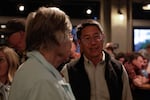
FILE – Phil Chang attends the Deschutes Democrats election returns watch party at the Unofficial Logging Co. in Bend, Ore., on May 21, 2024. Chang won his race, securing his seat as a Deschutes County Commissioner for another term.
Kathryn Styer Martínez / OPB
Chang said partisan politics are a fact of the electoral process, but also can “blind you to solutions” when trying to solve local problems. He noted that his Republican colleagues on the county board can sometimes veer into party politics over basic issues.
“I don’t think people should be carrying around as much partisan baggage as they do in these positions, but it is something that anyone who’s running for office needs to be ready to grapple with,” he added.
Mason Reece, a political scientist at MIT, coauthored a research paper this year that confirmed the existence of hidden partisanship in nonpartisan races.
Currently, as many as 75% of electoral competitions in the United States are nonpartisan, according to MIT researchers. But, Reece said, people are using partisan markers to help them make choices about who to vote for, “maybe through endorsements or personal knowledge of local candidates.”
His research doesn’t place a value judgment on whether increased partisanship is good or bad. But the research shows that not all nonpartisan contests are equal. “We know that in recent years things like school boards have become more polarizing and more partisan,” Reece said.
National reporting bears out this trend.
Small local races like in school boards or city councils can act as a springboard into the next level of politics. Judy Stiegler was a board member of the Bend-La Pine school district before eventually moving in the Oregon House of Representatives. John Hummel spent six years on Bend’s City Council before becoming the Deschutes County district attorney.
Currently, Anthony Broadman is seeking a state senate seat after spending four years on the Bend City Council. He initially ran in for city council in 2020, when two people dropped out of his race.
“I realized I want to support Anthony instead,” Dana Madison wrote on her withdrawal form that year. Michaela Garcia filed the same, writing, “ I am supporting my fellow runner for position 2, Anthony Broadman.”
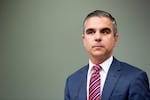
FILE – Councilor Anthony Broadman attends a city council meeting in Bend, Ore. on July 17, 2024.
Kathryn Styer Martínez / OPB
In 2018, Brian Hinderberger withdrew from a Bend City Council race before getting enough signatures to get on the ballot.
Hinderberger grew up in a working class family in Bend. After graduating from Mountain View High School, he joined the Navy and served three tours in the Persian Gulf before returning home and earning an associate’s degree from Central Oregon Community College and a bachelor’s from the University of Oregon.
Wanting to continue a life of public service, Hinderberger was fueled by a passion “to protect what is good.”
Before he could get enough signatures to be on the ballot, the Deschutes Democrats delivered a “needle in a balloon.”
At a party-organized town hall, Hinderberger made his pitch to the party.
“You’re not going to get elected,” he recalled a party official telling him at the event.
“It wasn’t pressure,” he said. “It was more of like, you’re wasting your time, you’re wasting your money, you’re not going to win. It was very blunt.”
He said the experience contributed to him dropping his Democratic Party registration. He now considers himself more of an independent voter.
In retrospect, he didn’t think he was the most prepared or perfect candidate, but he said the treatment felt unfair and ended his desire to be in politics. He doesn’t follow politics as closely now.
The seat Hinderberger had sought was eventually filled by a Democrat-endorsed candidate: Barb Campbell.



